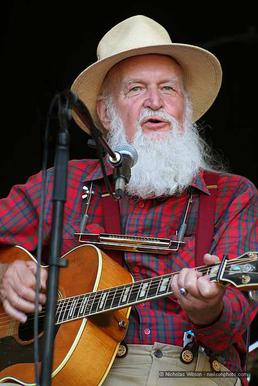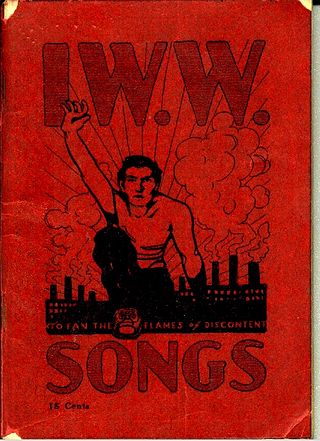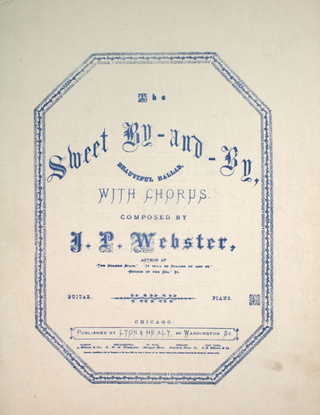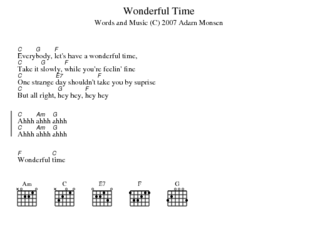
The Industrial Workers of the World (IWW), whose members are nicknamed "Wobblies", is an international labor union founded in Chicago in 1905. The nickname's origin is uncertain. Its ideology combines general unionism with industrial unionism, as it is a general union, subdivided between the various industries which employ its members. The philosophy and tactics of the IWW are described as "revolutionary industrial unionism", with ties to socialist, syndicalist, and anarchist labor movements.

Bruce Duncan "Utah" Phillips was an American labor organizer, folk singer, storyteller and poet. He described the struggles of labor unions and the power of direct action, self-identifying as an anarchist. He often promoted the Industrial Workers of the World in his music, actions, and words.

A pie is a baked dish which is usually made of a pastry dough casing that contains a filling of various sweet or savoury ingredients. Sweet pies may be filled with fruit, nuts, fruit preserves, brown sugar, sweetened vegetables, or with thicker fillings based on eggs and dairy. Savoury pies may be filled with meat, eggs and cheese or a mixture of meat and vegetables.

Joe Hill, born Joel Emmanuel Hägglund and also known as Joseph Hillström, was a Swedish-American labor activist, songwriter, and member of the Industrial Workers of the World. A native Swedish speaker, he learned English during the early 1900s, while working various jobs from New York to San Francisco. Hill, an immigrant worker frequently facing unemployment and underemployment, became a popular songwriter and cartoonist for the union. His songs include "The Preacher and the Slave", "The Tramp", "There Is Power in a Union", "The Rebel Girl", and "Casey Jones—the Union Scab", which express the harsh and combative life of itinerant workers, and call for workers to organize their efforts to improve working conditions.

"Solidarity Forever", written by Ralph Chaplin in 1915, is a popular trade union anthem. It is sung to the tune of "John Brown's Body" and "The Battle Hymn of the Republic". Although it was written as a song for the Industrial Workers of the World (IWW), other union movements, such as the AFL–CIO, have adopted the song as their own. The song has been performed by musicians such as Utah Phillips, and Pete Seeger. It was redone by Emcee Lynx and The Nightwatchman. It is still commonly sung at union meetings and rallies in the United States, Australia and Canada, and has also been sung at conferences of the Australian Labor Party and the Canadian New Democratic Party. This may have also inspired the hymn of the consumer cooperative movement, "The Battle Hymn of Cooperation", which is sung to the same tune.
Pie in the sky, an idiom meaning an impossible or unlikely idea or plan as well as an empty wish or promise.

Since the founding of the Industrial Workers of the World (IWW), songs have played a large part in spreading the message of the One Big Union. The songs are preserved in the Little Red Songbook.
"Limerick" is a traditional humorous drinking song with many obscene verses. The tune usually used for sung limericks is traditionally "Cielito Lindo," with the words arranged in the form of a limerick.
Wobbly lingo is a collection of technical language, jargon, and historic slang used by the Industrial Workers of the World, known as the Wobblies, for more than a century. Many Wobbly terms derive from or are coextensive with hobo expressions used through the 1940s.
"There Is A Balm in Gilead" is a traditional African American spiritual. The date of composition is unclear, though the song dates at least to the 19th century. A version of the refrain can be found in Washington Glass's 1854 hymn "The Sinner's Cure". The Clark Sisters recorded a version of Balm In Gilead in 1986.

"The Sweet By-and-By" is a Christian hymn with lyrics by S. Fillmore Bennett and music by Joseph P. Webster. It is recognizable by its chorus:
"All the Pretty Little Horses" is a traditional lullaby from the United States. It has inspired dozens of recordings and adaptations, as well as the title of Cormac McCarthy's 1992 novel All the Pretty Horses. The melody is also used in the score of the film Misty of Chincoteague based on the book by Marguerite Henry.
"Boil Them Cabbage Down" is an American folk song. Hoecakes are small cornmeal cakes that were baked over a fire on the blade of a hoe. A breakfast of hoecakes and cabbage soup testifies to the humble origins of this song. According to Alan Lomax, musicologist and folklorist formerly of the Library of Congress, this tune was originally associated with African slaves brought from Niger.

"The Red Flag" is a socialist song, emphasising the sacrifices and solidarity of the international labour movement. It is the anthem of the British Labour Party, the Northern Irish Social Democratic and Labour Party and the Irish Labour Party. It was formerly used by the New Zealand Labour Party until the late 1940s. The song is traditionally sung at the close of each party's national conference.

The ChordPro format text-based markup language for representing chord charts by describing the position of chords in relation to the song's lyrics. ChordPro also provides markup to denote song sections, song metadata, and generic annotations.
"Go Limp" is the penultimate track on Nina Simone's 1964 album Nina Simone in Concert, and is an adaptation of a protest song originally written by Alex Comfort during his involvement with the Campaign for Nuclear Disarmament.
"When This Cruel War Is Over", also known under the title "Weeping, Sad and Lonely", is a song written by Charles Carroll Sawyer with music by Henry Tucker. Published in 1863, it was a popular war song during the American Civil War, sung by both Union and Confederate troops.









